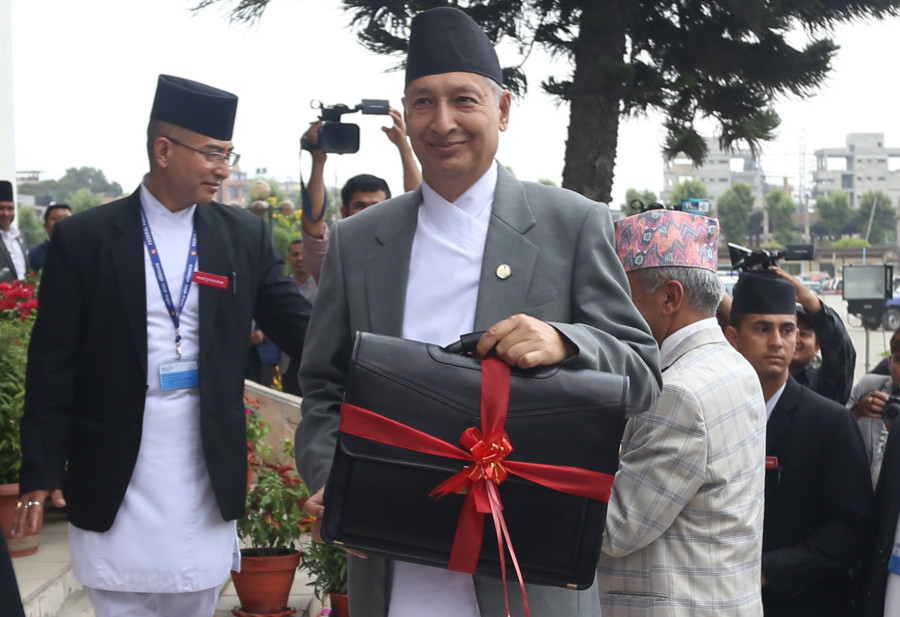Editorial
The federal budget is out, and the government has disappointed yet again
The government has once again resorted to populist measures
The budget for the fiscal year 2019-20 is out. The total budget has increased, from Rs1.31 trillion last fiscal year to Rs1.53 trillion. Similarly, the capital expenditure budget has increased from Rs313.99 billion to Rs408.59 billion. Like every year, the government’s plans seem to be lofty, and even unpragmatic to some extent. The finance minister began his speech by publicising how well the government has done with economic development—scoring high on economic indicators—and how it can build on this result to achieve double-digit growth in the upcoming fiscal year. This needs to be taken with a grain of salt, remembering that Khatiwada promised an 8 percent growth during last year’s budget speech—the actual rate being around the 6 percent mark.
[Read: Rs1.53 trillion: Ambitious and unrealistic]
It remains to be seen whether the money allocated for capital spending will be spent timely, or whether this will be done inefficiently like recent years. A big chunk of the government’s capital expenditure goes towards the development of critical physical infrastructure. While Finance Minister Yubaraj Khatiwada painted a rosy picture in this aspect, saying that the government was successful in speeding up the construction of national pride projects and other large infrastructure projects, this was definitely far from the truth. For instance, as of mid-May, the government managed to spend only 38 percent of the capital budget for the current fiscal year. Moreover, important projects, such as the Gautam Buddha International Airport and the Melamchi Drinking Water Project have hit multiple snags and delays—and have even been halted entirely during certain periods of the year. While the completion of such projects would probably help the government in realising its goals of double-digit economic growth, the government’s inability to actually hit milestones in a timely manner is sure to retard growth and potential investment.
[Read: Government revises tax structure and changes income tax slab for salary earners]
The budget speech also highlighted education again. Article 31 (2) of the Constitution gives every citizen the right to free, and compulsory, education up to the basic level (till grade 8) and free education up to the secondary level (grade 12) from the state. And it is good that the government is attempting to address this with its budget and policies. For one, the finance minister announced plans to improve community schools. He has promised free education through community schools. Khatiwada also mentioned supporting the upliftment of traditional schools such as gurukuls and madrassas into the larger school system, and the creation of an open university for those without access to regular schooling. However, the policies and plans Khatiwada announced seem to be riddled with populist measures. For all its lofty goals, the government’s education budget has only risen from Rs134.5 in the current fiscal year to Rs163.76 billion in the fiscal year 2019-20. The standard global practice has been to allocate at least 20 percent of the national budget on education: the speech confirms an allocation of 10.68 percent for 2019-20. The government cannot fulfil its ambitious goals with such a paltry increase in the budget for the education sector. Moreover, it remains to be seen whether the federal government will be successful in effectively allocating the chunk of the budget to the local level, and coordinating with the same. As it stands, the federal government has until now failed to do so.
[Read: Allocation of Rs 60 million to parliamentarians for their constituencies draws public ire]
The public had high hopes from Khatiwada when he was first announced as finance minister, given his status as an economic expert and a technocrat. When he announced—bowing to political pressure—the allocation of Rs40 million to every federal parliamentarian under the constituency development programme for the current fiscal year, many were disappointed. The constituency development programme has a history of not being utilised properly. Moreover, with the adoption of a federal system, the bulk responsibility of developing constituencies lies not with the federal parliamentarians but with the provincial and local governments. Failing to mark a departure from the past, the finance minister yet again seems to have succumbed to political pressure to such a degree that, not only has the unnecessary programme been included again, but the funds to each constituency has been increased to Rs60 million. With a majority mandate and four years to go in its term, there was no reason whatsoever to entertain such programmes. Khatiwada and the federal government have failed in this respect.
To sum up, Khatiwada has presented the budget revolving around the manifesto the Nepal Communist Party had floated for 2017 elections and told some untruths about the economy. He has promised highly ambitious policies and failed to resist political pressure.




 10.12°C Kathmandu
10.12°C Kathmandu














